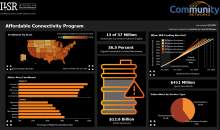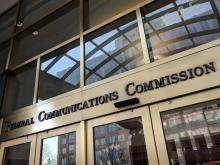New Resource: Tracking the Affordable Connectivity Program
On January 1st, 2022, the Federal Communications Commission launched the Affordable Connectivity Program (ACP) with $14.2 billion in funding designed to help American households pay for the monthly cost of their Internet subscription. In May, we published a story about the fate of the program, based on a prediction model we built that was intended to visualize how long we might expect the $14.2 billion fund to last before needing new Congressional appropriations to sustain it. Back then, the data showed that the fund would run out some time in 2024.
We’re back today not only with a new and improved model (based both on more granular geographic data and fed by an additional 16 weeks of enrollment data), but a new dashboard that pulls together a host of information from the Universal Service Administrative Company on where and how the Affordable Connectivity Program money is being spent.
A New Resource for Broadband Advocates, Local Policy Makers, and Elected Officials
Located at ACPdashboard.com, this new resource from ILSR includes information local broadband advocates, nonprofits, state legislators, and policy makers need to know about where enrollment efforts and expended funds stand today. It includes a breakdown by state for how enrollment numbers stand (as well as an estimate for the amount spent in each state so far), the current national eligible enrollment rate, information for 30 metropolitan areas, how much is being spent on service support versus devices, how many households are using the ACP for mobile versus wireline service, and the total left in the ACP fund. Our new prediction model shows that a little more than $410 million is leaving the bank account every month.



